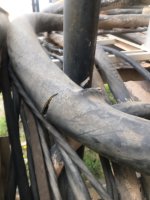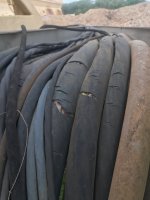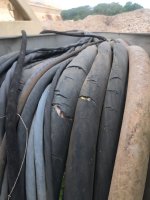Johnboy2316
Member
- Location
- Texas
- Occupation
- Industrial electrician
I have a customer with extreme uv damage to a 750mcm 4 conductor tray cable. With the cost of copper what it is today they really didn't want to hear my recommendation of complete cable replacement. While attempting to tape over the damaged areas ( for a very temporary fix ) I received quite a shock. After retrieving my trusty Fluke 87 I discovered that there was a voltage potential of up to 380v between the wet outer jacket and the cable tray it's laid in. This is a real safety problem. I megged the wire phase to phase and phase to ground and it was between 700 and 1500 M ohms. So it's not shorted but there is definitely an issue with the inner insulation as well if I'm getting voltage with the cable wet. Of course when it dries out you lose the voltage and all is good. However I can't tell my customer to only use their hot mix asphalt plant in dry conditions. I am looking for any input anyone may have. What does the NEC say about cable repairs and what options do I have other than complete cable replacement.



